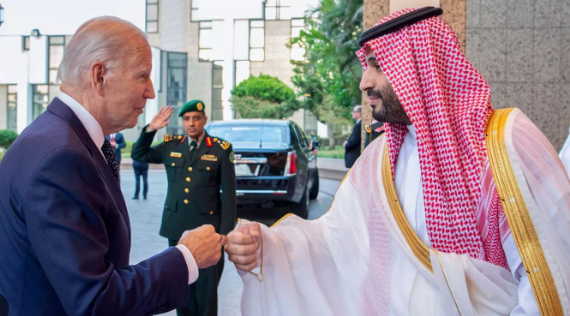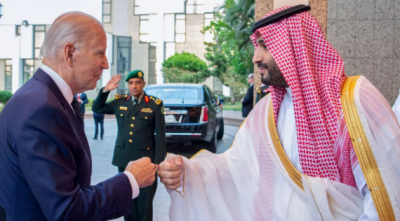The "Wall Street Journal" has reported that an agreement to normalize relations between Saudi Arabia and Israel under U.S. sponsorship could be reached within a year at the latest. However, the White House has reduced expectations by stating, according to Reuters, that "there is no agreed framework for an agreement that involves Saudi Arabia formally recognizing Israel." National Security Council spokesperson John Kirby noted that "there are still many discussions to be held here... There is no consensus on a set of negotiations, nor is there an agreed framework concerning normalization or any of the other security considerations we have with our friends in the region."
In a report published today, the Journal mentioned cautious optimism among American officials that "in the next nine to twelve months, they could reach more precise details about what could be the most significant peace agreement in the Middle East for a generation, but they warn that they face long odds."
The newspaper indicated that efforts have intensified "after Saudi Crown Prince Mohammed bin Salman met in Jeddah two weeks ago with Jake Sullivan, Biden's national security advisor, in an attempt to expedite talks." Negotiators have now moved on to discuss specifics, including Saudi requests for U.S. assistance in developing a civilian nuclear program and strict security guarantees.
The Journal pointed out that the Saudis "are seeking significant concessions from Israel that would help advance the establishment of a Palestinian state. In return, the United States is pressuring Saudi Arabia to impose restrictions on its growing relationship with China." Israeli National Security Advisor Tzachi Hanegbi commented that negotiators have yet to present specific ideas to Israeli leaders.
The article continued, stating, "While U.S. officials say Biden has not yet decided the price he is willing to pay, the president’s focus on the deal reflects his view that America should remain a central player in the Middle East to contain Iran, isolate Russia, and thwart China’s efforts to supplant U.S. interests in the region."
"In exchange for significant U.S. concessions to Saudi Arabia, the Biden administration is trying to obtain assurances from the Kingdom that it will distance itself—both economically and militarily—from China, U.S. officials say," added the newspaper. According to its sources, the U.S. plan aims to distance China from Saudi Arabia: "The U.S. could seek assurances from Saudi Arabia that it will not allow China to build military bases in the Kingdom—a topic that has become especially sensitive between the Biden administration and the United Arab Emirates. They indicated that negotiators may also seek to impose restrictions on Saudi Arabia's use of technology developed by the Chinese company Huawei and insist that Riyadh will price its oil sales in U.S. dollars, not the Chinese currency. The U.S. is also expected to look for ways to resolve the dispute over oil prices driven by ongoing production cuts from Saudi Arabia."
The Journal noted that "Crown Prince Mohammed bin Salman is serious about trying to broker a deal. However, he has informed his aides that he is not ready to establish full diplomatic relations with Israel, similar to the relations with the United Arab Emirates, which signed an agreement in 2020, according to Saudi officials."
The article continued: "The Crown Prince has told his advisors that he is in no rush, especially with the current hardline coalition government in Israel opposing the establishment of an independent Palestinian state." Brian Katulis, vice president for policy at the Middle East Institute in Washington, compared the efforts to mountain climbers trying to summit multiple peaks of Mount Everest in succession. He stated, "It’s a very dangerous scene. There are four or five things they need to accomplish to ensure they do not crumble into thin air and launch off the mountain. To me, it seems unlikely in the short term, but who knows?"
He speculated: "One of the main obstacles facing negotiators is the concessions Israel will have to make to the Palestinians in exchange for open diplomatic relations with Saudi Arabia. U.S. and Saudi officials say Israel will need to offer a significant package that bolsters efforts to establish an independent Palestinian state. Israeli leaders are downplaying the significance of the Palestinian issue in the talks."
The newspaper revealed: "Israeli officials are concerned that U.S. support for a civilian nuclear program in Saudi Arabia could pave the way for Riyadh to develop nuclear weapons, which the Crown Prince has said he would do if Iran did it first." The details of the deal are also expected to come under scrutiny in Congress, where many lawmakers are reluctant to offer concessions.
U.S. lawmakers have already raised concerns about the possibility of the U.S. granting Saudi Arabia treaty-binding guarantees that the U.S. would defend the Kingdom if it were attacked—a guarantee requiring Senate approval. Even lesser security assurances that do not demand explicit congressional support are likely to face resistance in Washington.
Some lawmakers oppose discussions about expanding arms sales to Saudi Arabia, which Biden placed restrictions on upon taking office in 2021 in protest of the Kingdom’s use of American weapons in Yemen.
The paper concluded, "If the United States can negotiate an acceptable deal for Saudi, Israeli, Palestinian leaders, and Congress, the Biden administration hopes that global pressure to support a historically transformative deal will push opposition parties in Israel to join Netanyahu and endorse it."




